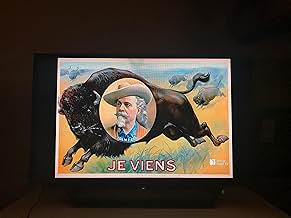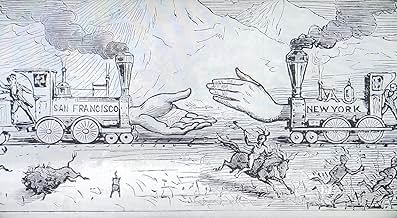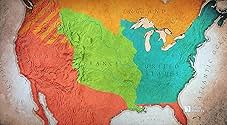CALIFICACIÓN DE IMDb
8.3/10
794
TU CALIFICACIÓN
Un viaje a través de más de 10.000 años de historia de Norteamérica y de algunos de los paisajes más emblemáticos del continente, para seguir la evolución del mamífero.Un viaje a través de más de 10.000 años de historia de Norteamérica y de algunos de los paisajes más emblemáticos del continente, para seguir la evolución del mamífero.Un viaje a través de más de 10.000 años de historia de Norteamérica y de algunos de los paisajes más emblemáticos del continente, para seguir la evolución del mamífero.
- Premios
- 1 premio ganado en total
Explorar episodios
Opiniones destacadas
10mdh627
I am from Cincinnati. Each time I visited our zoo I stopped at the statue of Martha, the last passenger pigeon to survive the massacre of her species. She died here all alone. It makes me cry each time I think that of the millions of her kind she was all alone at the end, with no way to pass on to a new generation.
I cried in this show, too. Seeing the hunters sitting atop that huge mound of buffalo skulls was disturbing. And also the horrible accounts of the treatment of native Americans. Thank God for those wonderful people who persevered in their mission to save this wonderful creature. It's a shame the government wasn't as kind to the different tribes.
I cried in this show, too. Seeing the hunters sitting atop that huge mound of buffalo skulls was disturbing. And also the horrible accounts of the treatment of native Americans. Thank God for those wonderful people who persevered in their mission to save this wonderful creature. It's a shame the government wasn't as kind to the different tribes.
10jmlj99
Hard to watch? Yes. It is heartbreaking. I started watching the show with my husband, it was very depressing, but the story and the history needed to be told and shared. We all need to know and remember how people wiped out the Native Americans and the lands and the buffaloes that sustained them. It's so hard to believe that people could not respect the land and lives of others in the past. That was the way in the past. Take what you want and who cares about the feelings and the lifestyle of the natives. I'm glad I'm in my 60's and it saddens me to see that we the American people still don't recognize how badly we screwed the native population.
Thoroughly enjoyed the detail, learned a lot. Couple things I thought coud be added was the Buffalo Jump in Alberta is a fantastic site to visit, it's talked about, (the process) but no word on the musuem with outside real life display.
A good book to read is called Ecological Buffalo by Wes Olson.2022.
Having the interviews adds an element of honesty and integrity of the story.
There was a few times I did FFW but for the most part I stuck with it, Ken Burns can really make you chew on a subject that's for sure,
Having 2 epsiodes does, to me, again lend credibility to the story, and not just skimming the surface of, we shot them to almost oblivion.
Another must see, if you do make it to Aberta, is Elk Island, Wood Buffalo NP and Rocky Mountain House, usually there to see.
Banff NP has introduced back into the park but they are deep in the park. Some excellent videos on the UTube nay by Parks Canada.
A good book to read is called Ecological Buffalo by Wes Olson.2022.
Having the interviews adds an element of honesty and integrity of the story.
There was a few times I did FFW but for the most part I stuck with it, Ken Burns can really make you chew on a subject that's for sure,
Having 2 epsiodes does, to me, again lend credibility to the story, and not just skimming the surface of, we shot them to almost oblivion.
Another must see, if you do make it to Aberta, is Elk Island, Wood Buffalo NP and Rocky Mountain House, usually there to see.
Banff NP has introduced back into the park but they are deep in the park. Some excellent videos on the UTube nay by Parks Canada.
The drive to near extinction of the American buffalo was perhaps inevitable: technology has given mankind many options to exploit nature, but without the sense of restraint to do so sustainably. What's shocking in this documentary is not just the speed with which the buffalo were exterminated, but that everyone could see what was happening and did nothing to stop it. They could also see that the end of the species would end the traditional way of life of the native human population; mostly, Americans of European ancestry saw this as a good thing. The second part tells the story of how the buffalo was saved; but it could be argued that the peoples who depended on it have never recovered. There's a warning here for all of us today as we face climate change: might we once again walk eyes-open into environmental catastrophe, not appreciating what we have until after it has gone?
I just finished watching The American Buffalo and once again Ken Burns hits it out of the park! I thought I knew the plight of the Bison, and how it also impacted Native Americans, but I learned much more about the history of the past 200 years. This is a very touching and thought provoking documentary and reminded me of the photo of a huge mountain of bison skulls I first saw as a child. I'd never even heard of the amazing meter shower of the 1880s or of the horrid Gore who killed thousands of animals just for fun. I'm looking forward to part 2 tomorrow night. At least enough calves were saved that the species did not go extinct. Thank God for Yellowstone Park.
¿Sabías que…?
- TriviaA hour long conversation preview with Ken Burns and indigenous leaders is hosted by Judy Woodruff on PBS 23 September.
- ConexionesFeatured in Ken Burns: One Nation, Many Stories (2024)
Selecciones populares
Inicia sesión para calificar y agrega a la lista de videos para obtener recomendaciones personalizadas
- How many seasons does The American Buffalo have?Con tecnología de Alexa
Detalles
- Tiempo de ejecución
- 3h 54min(234 min)
- Color
Contribuir a esta página
Sugiere una edición o agrega el contenido que falta




























